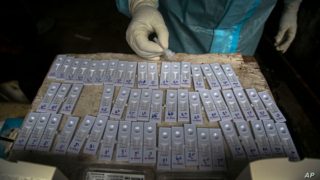NEW DELHI – With the fastest COVID-19 growth in the world, India has raced past 2 million cases, as public health experts warn that the pandemic in the world’s second most populous country will not slow anytime soon.
The grim milestone came as tens of thousands of community health workers went on a two-day strike, demanding better pay and saying they were not properly equipped to handle the highly contagious coronavirus.
“This number was coming. If you are growing at four percent daily, it will jump from one million to two million in three weeks,” points out virologist Shahid Jameel. “It is actually India’s rate of increase that is worrying.”
Only two other countries have crossed the two million mark – the United States and Brazil. India’s tally is now nearly 2.03 million, according to the health ministry.
The pandemic has increased in India since June, when authorities lifted a stringent lockdown to restart a battered economy. And while mega-cities like Delhi and Mumbai are now showing a downward trend, infections are accelerating in states like Andhra Pradesh, Bihar and Orissa, where the health infrastructure is inadequate.
Concerns about coping with the onslaught deepened Friday, when a network of women community health workers known as Accredited Social Health Activists or ASHA (hope), who have been assisting local authorities in contact tracing and tracking people under quarantine, started a two-day strike.
The nearly one million workers have been on the frontline for years in vaccination and maternal health programs in rural areas, where there is no direct access to health care facilities and where the virus has now reached.
The protesting health workers, who are paid about $40 a month, are demanding higher wages, timely payments and proper medical gear, saying they did not have personal protective equipment or sanitizers.
“At least 100 health workers have died of COVID-19 in the country so far, but there has been no insurance provided to them by the government,” said A. R, Sindhu, secretary of the Centre of Trade Unions, a participant in the strike.
Writing in the Times of India newspaper, virologist Jacob John and Zarir Udwadia said that the “pandemic had cruelly exposed our weakest link – badly equipped and understaffed public hospitals, chronic shortages of hospital beds and unmotivated, poorly trained staff.”
Several public health experts blame the spiraling pandemic on India’s failure to effectively implement strategies needed to limit the highly contagious virus – testing, contact tracing to break the chain of transmission and isolation.
India tests about 16,000 people per million — a fraction of the number of tests conducted in the United States, say experts. Fear of contracting the virus has also become an impediment, they say.

A health worker takes a nasal swab samples to test for COVID-19 in Gauhati, India, Aug. 7, 2020.
‘While testing is a matter of resources and technology, tracing and isolation are a matter of trust,” says Jameel. “People are not going for testing because they fear a positive test. The narrative built around the virus is that if you get it you are doomed.”
Doctors point out that states like Kerala, which used thousands of volunteers to do aggressive contact tracing, have fared much better than other parts of the country.
There have been other successes also. In Dharavi, the country’s biggest slum in Mumbai that packs a million people in just two square kilometers, authorities overcame challenges such as squalor and density to contain the virus. The strategy of community engagement, testing and treating won praise from the World Health Organization.
With its battle against the pandemic likely to drag on for months, India is drawing some consolation from the relatively low fatalities – 41,585 people have succumbed to the virus according to the latest tally. Experts attribute that to India’s relatively young population, while some medical practitioners have speculated that the virus raging in India is less lethal.
Among those infected recently is India’s home minister, Amit Shah, counted as the second most powerful man in the government. He tweeted on Sunday that he was being admitted to a hospital after testing positive.
FEATURED IMAGE: A health worker performs tests after taking nasal swab samples to test for COVID-19 in Gauhati, India, Aug. 7, 2020.
By Anjana Pasricha/VOA






